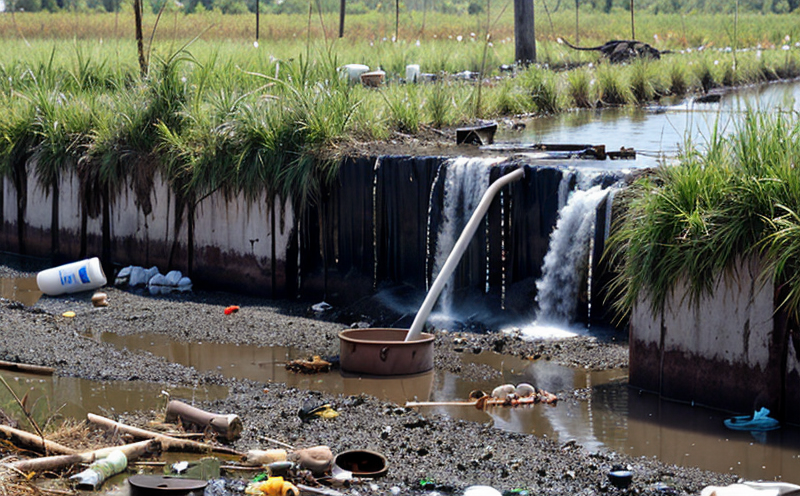CFR 40 Pollutant Testing Requirements for Water and Waste
The Codified Federal Regulations Title 40 (CFR 40) outlines stringent environmental protection standards, particularly in the areas of air pollution control and water quality. This regulation governs testing requirements to ensure compliance with federal regulations related to pollutants found in water and waste streams. Compliance is critical for industries that process or discharge wastewater into public systems.
The primary focus of this service involves the analysis of various pollutants as outlined in CFR 40 Part 132. This part specifically addresses effluent limitations and wastewater discharge regulations for surface water quality protection. Compliance with these rules is essential to avoid penalties, legal action, and potential environmental damage.
Our laboratory adheres strictly to the methodologies provided in ISO 7603:1985, which establishes the basis for measuring the concentration of certain pollutants like lead, mercury, cadmium, copper, zinc, and other heavy metals. These tests are critical as they help determine whether effluent limits set by the Environmental Protection Agency (EPA) are being met.
The testing process begins with detailed sample collection from industrial processes or wastewater discharge points. Once collected, samples undergo rigorous preparation steps including filtration and dilution to ensure accurate analysis. Following preparation, we use state-of-the-art instrumentation such as inductively coupled plasma mass spectrometry (ICP-MS) for heavy metals, gas chromatography-mass spectrometry (GC-MS) for volatile organic compounds (VOCs), and high-performance liquid chromatography (HPLC).
Our team of experts ensures that all testing adheres to the strictest quality control protocols. This includes using reference materials traceable to national standards, regular calibration of instruments, and proficiency testing with samples provided by external laboratories.
- Quality Control: We utilize reference materials from NIST (National Institute of Standards and Technology) for method validation and routine calibrations.
- Instrument Calibration: All analytical instruments undergo rigorous calibration before each batch of tests to ensure accuracy.
- Proficiency Testing: Samples from external labs are tested alongside our internal samples to maintain proficiency in testing.
The results from these analyses provide critical data that allows industries to monitor and manage their environmental impact. Compliance with CFR 40 Part 132 helps prevent violations, ensuring a sustainable approach to industrial waste management.
In summary, our service provides comprehensive pollutant testing for water and wastewater streams under CFR 40 regulations. This ensures that clients meet stringent environmental standards, avoid legal issues, and contribute positively to environmental sustainability.
Industry Applications
The industry applications of this service are broad and include various sectors such as manufacturing, chemical processing, pharmaceuticals, and municipal water treatment facilities. These industries often have discharge points that need regular monitoring for pollutants like heavy metals, organic solvents, and other regulated compounds.
Municipal wastewater plants also benefit from our services by ensuring compliance with local and federal regulations. This helps in maintaining the quality of receiving waters, thereby protecting aquatic ecosystems downstream.
Pharmaceutical manufacturers face stringent regulatory requirements to ensure that their products do not contaminate water supplies during manufacturing processes or through improper waste disposal. Our service ensures that these industries comply by providing accurate data on pollutant levels.
The chemical processing industry relies heavily on this testing for quality assurance and process optimization. By identifying pollutants early in the production cycle, companies can minimize environmental impact while improving efficiency and product quality.
Overall, our services are designed to support industries that must adhere to rigorous environmental regulations, ensuring compliance with CFR 40 Part 132 requirements and contributing to sustainable practices.
Quality and Reliability Assurance
The reliability of the testing results is paramount in ensuring accurate compliance with CFR 40 Part 132. Our laboratory follows strict quality assurance protocols that ensure consistent, reliable data:
- Reference Materials: Utilizing reference materials from NIST (National Institute of Standards and Technology) to validate methods and calibrate instruments.
- Instrument Calibration: Regular calibration of all analytical instruments to maintain precision and accuracy.
- Proficiency Testing: Participation in proficiency testing schemes with samples provided by external laboratories to ensure consistent performance.
- Data Validation: Cross-checking results using multiple analytical techniques where possible to validate findings.
- Traceability: Ensuring that all reference materials and standards are traceable to national standards.
The combination of these measures ensures that our testing results are reliable, accurate, and can be trusted for regulatory compliance. Our commitment to quality is further demonstrated by our adherence to international standards such as ISO 17025 for laboratory accreditation.
International Acceptance and Recognition
The tests conducted under CFR 40 Part 132 are internationally recognized and accepted, ensuring that the results obtained from our laboratory can be used in various jurisdictions around the world. Compliance with these regulations is not only a requirement for U.S. companies but also benefits those operating globally.
Our laboratory’s compliance with ISO standards such as ISO 17025, which ensures that laboratories provide services and results of high quality, enhances our reputation in the international community. This accreditation is recognized by regulatory bodies worldwide, including the European Union (EU) and other countries adhering to international standards.
The acceptance of our test results extends beyond national boundaries, making them suitable for use in global markets. Compliance with CFR 40 regulations ensures that industries can operate confidently across different regions without encountering discrepancies or rejections due to non-compliance.
This international recognition is crucial for companies involved in cross-border operations or those seeking to expand their market reach. By adhering to these stringent testing protocols, we ensure that our clients are prepared for global challenges and opportunities.





